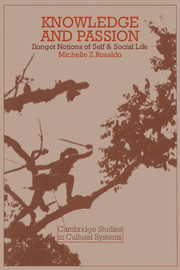Book contents
- Frontmatter
- Contents
- Preface
- Acknowledgments
- 1 The Ilongots
- 2 Knowledge, passion, and the heart
- 3 Knowledge, identity, and order in an egalitarian world
- 4 Horticulture, hunting, and the ‘height’ of men's hearts
- 5 Headhunting: a tale of ‘fathers,’ ‘brothers,’ and ‘sons’
- 6 Negotiating anger: oratory and the knowledge of adults
- 7 Conclusion: Self and social life
- Appendix 1 Ilongot phonology
- Appendix 2 Glossary
- Notes
- Bibliography
- Index
2 - Knowledge, passion, and the heart
Published online by Cambridge University Press: 05 June 2012
- Frontmatter
- Contents
- Preface
- Acknowledgments
- 1 The Ilongots
- 2 Knowledge, passion, and the heart
- 3 Knowledge, identity, and order in an egalitarian world
- 4 Horticulture, hunting, and the ‘height’ of men's hearts
- 5 Headhunting: a tale of ‘fathers,’ ‘brothers,’ and ‘sons’
- 6 Negotiating anger: oratory and the knowledge of adults
- 7 Conclusion: Self and social life
- Appendix 1 Ilongot phonology
- Appendix 2 Glossary
- Notes
- Bibliography
- Index
Summary
Anthropology conceived in part as discourse on the theme of human cultural differences necessarily confronts the irony Lévi-Strauss introduces as a basic theme of Tristes Tropiques: As strange and “primitive” worlds become more accessible to our inquiry, they also become less foreign, more like us, and more deeply shaped by their relation to our own world. Lévi-Strauss, of course, was speaking of the fact that colonial expansion was what made modern anthropological fieldwork possible in the first place. But his reflections on South America point to yet another sense in which the irony holds true: In dialogue with informants, both parties accommodate one another; in making their lives open to our questions and to a form of discourse that begs for system and reflection, the natives who “inform” us construct what are always situated and necessarily partial interpretations of more complexly textured modes of life.
So our accounts are shaped not only by the concerns of the observer, but, at the same time, by the sorts of simplifications through which our interlocutors give order to, as they reflect upon, their times and lives. Summary and system are moments in cross-cultural dialogue and analysis – in my case, they emerged from talking with informants about how they used their language, and about the sense of words with which they characterized and explained the nature of human action, and the interest of activities as diverse as killing, gardening, and hunting.
- Type
- Chapter
- Information
- Knowledge and Passion , pp. 31 - 60Publisher: Cambridge University PressPrint publication year: 1980
- 1
- Cited by



